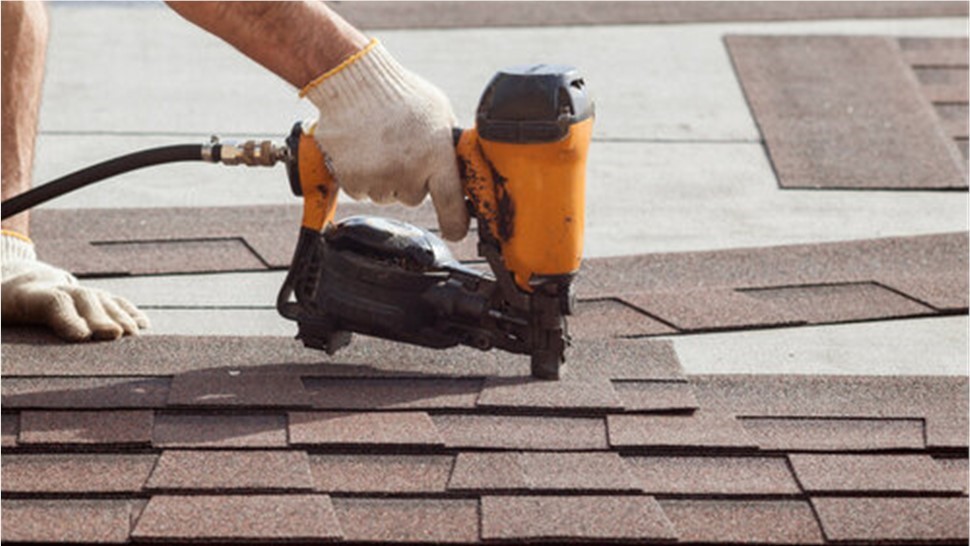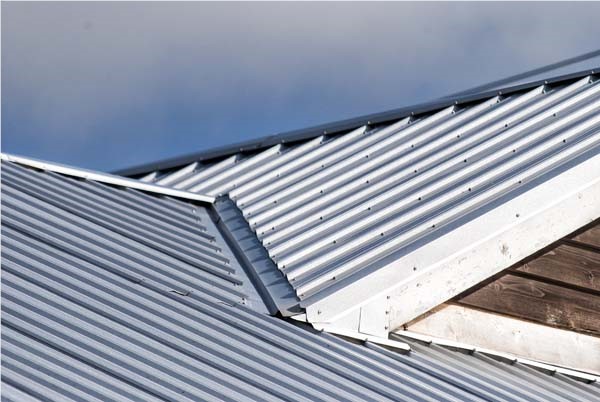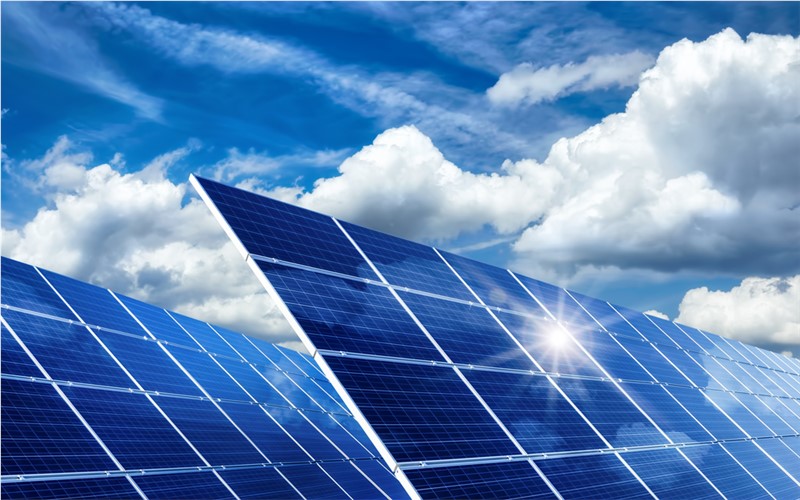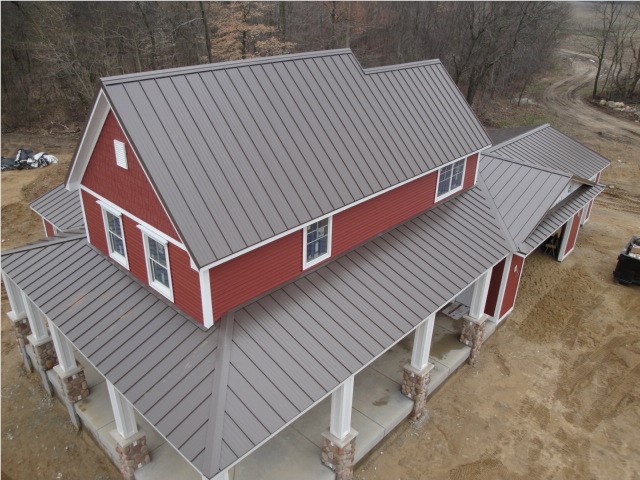While shingles are a popular choice because of their low cost, they can’t hold a candle to metal roofs when it comes to durability, longevity, and superior protection of your home. Given that a home is the most expensive thing most people will buy in their lifetime, it only makes sense to protect that investment with a roof that’s going to stand the test of time. However, there are a lot of myths and misconceptions floating around about metal roofs. These myths can sometimes cause a person who would have benefited from a metal roof to decide not to get one.
MYTH #1: METAL ROOFS ARE OUTDATED
In many people’s minds, when they hear “metal roof,” they immediately picture the kind of corrugated tin roofing that sometimes appears on barns and other structures. Or, they think of an ancient home that had a metal roof, and the whole thing is so dreadfully outdated that the roof suffers by association. However, while technologies, trends, and building materials will come and go, what will never go out of style is the fact that you get huge value when you choose a metal roof. Metal roofs last nearly a lifetime, saving you from the need to re-roof your home again and again.
MYTH #2: METAL ROOFS DETRACT FROM YOUR HOME’S APPEARANCE
Metal roofs actually provide a sleek, sharp appearance to a home, which many people find to be very attractive. When you talk about curb appeal, one of the most appealing things in the world to a future homebuyer is going to be the fact that they won’t have to re-roof the house anytime soon. Since metal roofing comes in multiple different textures and styles, you can almost always find an option that looks amazing and fits perfectly with the other architectural elements on your home. However, that being said, what is beautiful and attractive versus what is ugly and unappealing will always be a matter of opinion, and it’s ok if some people simply don’t prefer the look of a metal roof or don’t think it goes with the architectural style of a home.
MYTH #3: SINCE EVERYONE USES SHINGLES, SHINGLES MUST BE THE BEST.
Just because people follow the herd doesn’t mean that the herd mentality is right or best. People choose shingles because they are cheap, quick, and easy. They’re familiar with the architectural appearance of shingles on a home, so it’s easy to envision what the home will look like once the roof is done. In addition, builders and roofers like to install shingles because it allows them to hire cheap workers. Installing shingles takes far less skill and craftsmanship than installing a metal roof, which means that labor is readily available for a relatively low wage.
However, shingles are inferior to metal roofing in many ways, including:
- In many people’s minds, when they hear “metal roof,” they immediately picture the kind of corrugated tin roofing that sometimes appears on barns and other structures. Or, they think of an ancient home that had a metal roof, and the whole thing is so dreadfully outdated that the roof suffers by association. However, while technologies, trends, and building materials will come and go, what will never go out of style is the fact that you get huge value when you choose a metal roof. Metal roofs last nearly a lifetime, saving you from the need to re-roof your home again and again.
However, shingles are inferior to metal roofing in many ways, including:
- They don’t last as long.
- They are susceptible to damage by rain, wind, UV light, and other debris hitting your roof.
- Their energy efficiency performance is lower, adding to your air conditioning bills.
- They are not environmentally friendly (old shingles go into the landfill).
MYTH #4: METAL ROOFS ARE HEAVIER
Actually, metal is one of the lightest-weight roofing materials out there. It depends on the metal you choose, but aluminum is the most lightweight, clocking in at around 50 pounds per square. Contrast this to shingles, which can weigh anywhere from 200 pounds per square for basic shingles to 500 pounds per square for higher-end shingles. Many people put shingles over top of existing shingles without giving it a second thought, but then they balk at the supposed weight that a metal roof will add to their home’s burden. If your roof can support the weight of shingles, it can far more easily support the weight of metal.
MYTH #5: METAL ROOFS ARE HOTTER IN THE SUMMER
Our Florida summers get hot, and when you consider that your choice of roofing materials could make your home that much hotter, it makes you want to think twice. So which type of roof is going to heat up your home more? The answer may surprise you. It’s shingles. Modern metal roofs possess two properties that make them extremely energy efficient, making them great at helping to keep your home cooler in the summer.
First, they have high reflectivity. Light hits them and it reflects right back off toward the sky. Second, they have high emissivity. This means that they deflect (or emit) the heat energy that strikes them almost instantaneously, rather than absorbing it and releasing that energy over time. A substance with high emissivity is hot to the touch because it’s taking all the heat that strikes it and giving it back immediately. (In other words, don’t walk barefoot on your metal roof.)
Shingles are not reflective and have low emissivity, meaning that they accept more of that heat and transfer it to your attic. Excess warm air in your attic is a big reason that your living space heats up during the daytime. When you make the switch to metal roofing, your air conditioner won’t have to work nearly as hard, meaning that you’ll be able to cut down on energy consumption.
MYTH #6: METAL ROOFS ARE DEAFENINGLY NOISY WHEN IT RAINS
Metal roofs got a bad rap for being noisy because of metal roof installation methods from 50 years ago. One thing that we’ll say is that many people find it extra-soothing to fall asleep to the sound of raindrops pattering on the roof. It is a form of white noise that has a way of putting them straight to sleep, and they sleep deeply and soundly.
However, if that’s not your thing, there’s good news. The installation method of your metal roof has a lot to do with whether or not you will hear much noise, and there are ways to put padding material between the metal and the plywood decking so that you’ll barely hear any sound.
If you’d like to talk with one of our customers and ask them about their experience with whether their metal roof is too noisy or not, Hippo Roof keeps a list on file of customers who are willing to act as a reference. If you need to, we can refer you to someone who is able to talk to you about their experience. At the end of the day, though, we’re confident that you won’t find your metal roof to be noisy, much less “deafening.”
MYTH #7: LIGHTNING WILL STRIKE A METAL ROOF
The background for this myth is that it is well known that metal acts as an electrical conductor. However, what’s not true is that a metal roof will do anything to attract lightning. You’re just as (un)likely to be hit by lightning with a metal roof as without one. However, here’s where the metal on your roof will benefit you. First, because it’s a conductive material, it will spread out the effect of the lightning strike if you ever do have one, lessening the effect at any one point. Second, because it’s not a combustible material, it will reduce your risk that that lightning strike will cause a fire, resulting in further damage to your home.
Rest assured that our professional metal roof installation crew will ensure that your metal roof is grounded properly so that if a lightning strike did occur, it would simply transfer that electricity directly into the ground.
MYTH #8: METAL ROOFS ARE PRONE TO RUST
The old kind, yes. The new kind, not so much. We’ve all seen a disgusting metal roof that had unsightly rust streaks all up and down it. We don’t blame you if you don’t want that on your house. We wouldn’t, either. But again, that rusty old roof was made from a kind of corrugated metal roofing that is completely different from the metal roofing of today. With high-tech coatings on the metal, your roof will resist rust (even in a climate with salty air like we have here in Florida) and continue to look great for years to come.
MYTH #9: THE FASTENERS ON METAL ROOF ARE PRIME SPOTS FOR LEAKS
OK, here’s a puzzle for you. Metal roofing panels are built with a series of holes in them, and the panels are installed by inserting screws through those holes and into the wood underneath. How do you protect the screw holes from leaking? Aren’t you just asking for water damage in every hole? No, you’re not. There are two main lines of defense against your metal roof ever leaking.
Every screw is drilled down over a neoprene washer, which acts as an excellent sealant all by itself. Neoprene has a low rate of oxidation and is resistant to sun, weather, ozone, and aging. The water that reaches your screws, will be stopped in its tracks from getting any further.
The screws themselves aren’t embedded straight into your roof. Instead, they’re screwed into a grid of special boards that are installed above your roof’s decking material. These boards are extremely unlikely to ever get the least bit wet, much less suffer decay from water damage. However, even if they did, it wouldn’t be your plywood decking or your trusses that were getting damaged—just the grid of overlaying boards, which are not nearly as essential to your home’s structural integrity.
MYTH #10: METAL ROOFING IS EXTREMELY PRICEY
There’s no doubt that a metal roof is a desirable thing, but many people feel that metal roofs are a high-end item that must be out of their price range. Yes, it’s true that metal roofing tends to cost more than shingles, because the materials are more expensive and the people who install it have to be more skilled (driving labor costs up). However, what if there was a way that you could afford a metal roof after all? Maybe you can! With Hippo Roof, you have the opportunity to get a metal roof for the same price as shingles.* Now that’s a deal you can’t pass up. Why not schedule an interview with one of our roofing experts to go over the options with you and discuss an estimate of your price? You have nothing to lose and everything to gain.
Subscribe to Hippo Roofing's Blog






Comments